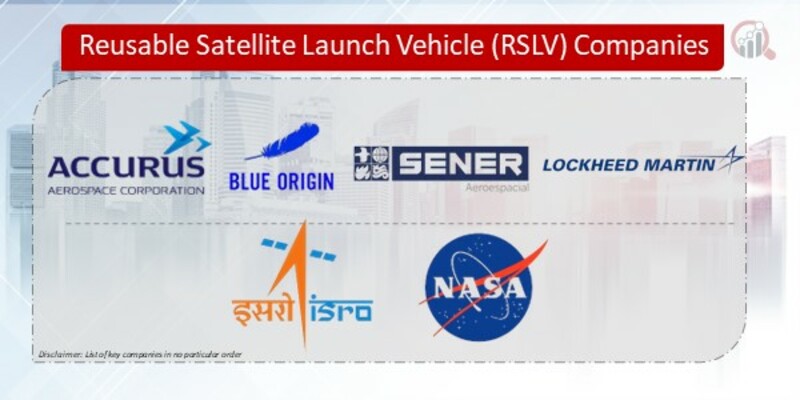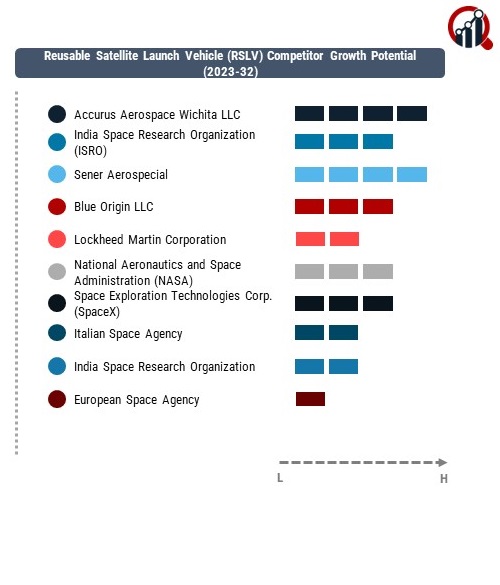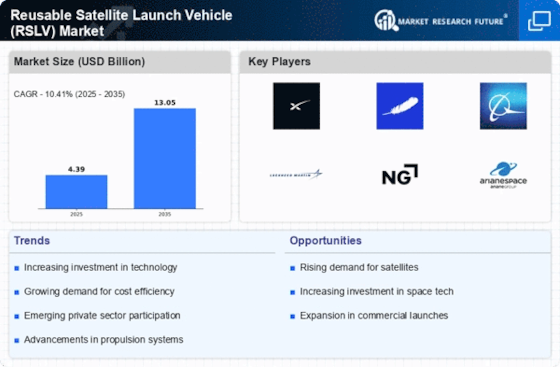Top Industry Leaders in the Reusable Satellite Launch Vehicle Market

The Reusable Satellite Launch Vehicle (RSLV) market has witnessed significant growth in recent years, driven by the increasing demand for cost-effective and sustainable space exploration solutions. The competitive landscape of this market is dynamic, with several key players vying for dominance through strategic initiatives, technological advancements, and innovative approaches.
Key Players in the Reusable Satellite Launch Vehicle (RSLV) Market
- Accurus Aerospace Wichita LLC
- India Space Research Organization (ISRO)
- Sener Aerospecial
- Blue Origin LLC
- Lockheed Martin Corporation
- National Aeronautics and Space Administration (NASA)
- Space Exploration Technologies Corp. (SpaceX)
- Italian Space Agency
- India Space Research Organization
- European Space Agency
Strategies Adopted by Key Players
Key players in the RSLV market have implemented various strategies to gain a competitive edge. SpaceX's strategy of vertically integrating its supply chain, coupled with aggressive pricing and consistent successful launches, has positioned the company as a market leader. Blue Origin has focused on developing reusable engines and suborbital platforms, aiming to reduce launch costs and enhance accessibility to space.
Arianespace, while traditionally using expendable launch vehicles, is adapting to the changing market dynamics by exploring reusability options. Rocket Lab, on the other hand, emphasizes the importance of dedicated small satellite launches, catering to the growing demand for constellation deployments.
Factors for Market Share Analysis
Several factors contribute to the analysis of market share in the RSLV sector. Reliability, launch frequency, payload capacity, and reusability rates are critical metrics. SpaceX's high reusability rates and successful launches have positioned it as a frontrunner. The ability to cater to diverse payload sizes, from small satellites to heavy payloads, also influences market share. Additionally, the capability to offer flexible and cost-effective launch options for both commercial and government customers plays a crucial role in market positioning.
New and Emerging Companies
The RSLV market has witnessed the emergence of new entrants looking to disrupt traditional space launch approaches. Relativity Space, a California-based startup, aims to revolutionize rocket manufacturing through 3D printing technology. Their Terran 1 rocket, set to be one of the first fully 3D-printed rockets, targets the small and medium satellite launch market.
Firefly Aerospace is another notable player, focusing on providing cost-effective launch services for small and medium payloads. Their Alpha rocket, with a capacity of 1 ton to Low Earth Orbit (LEO), has gained attention for its competitive pricing and dedicated launches for small satellites.
Industry News and Current Trends
The RSLV market is dynamic, with frequent developments, partnerships, and technological advancements shaping its trajectory. SpaceX's Starship, a fully reusable spacecraft in development, has the potential to further disrupt the market by enabling missions beyond Earth's orbit, including crewed missions to Mars.
In terms of international collaborations, the European Space Agency (ESA) and the European Commission are working on the Themis reusable rocket project. This joint initiative aims to develop a reusable first stage for future European launch vehicles, aligning with the global trend towards sustainable and cost-efficient space exploration.
Company Investment Trends
Investment trends in the RSLV market reflect the growing confidence in the commercial space sector. Established players like SpaceX continue to attract substantial investments, allowing for ambitious projects and continuous research and development efforts. Blue Origin, backed by Jeff Bezos's significant financial commitment, has maintained a robust investment strategy to fuel its endeavors in reusable space launch technology.
Venture capital has also flowed into startups like Relativity Space and Firefly Aerospace, signaling investor optimism in the potential of new, disruptive players. The shift towards sustainable space practices and the demand for cost-effective launch solutions have created a favorable environment for securing investments in the RSLV sector.
Overall Competitive Scenario
In summary, the Reusable Satellite Launch Vehicle market is witnessing intense competition, driven by technological innovation, cost-effectiveness, and sustainability. Established players like SpaceX and Blue Origin continue to dominate, leveraging their experience and significant investments in reusable rocket technology. However, new entrants like Relativity Space and Firefly Aerospace are challenging the status quo with innovative approaches, promising technology, and attractive pricing models.
The industry's competitive landscape is expected to evolve rapidly as companies explore new markets, collaborate on international projects, and strive for advancements in reusable rocket technology. With ongoing developments in space exploration and a growing demand for satellite launches, the RSLV market is poised for further expansion, making it a focal point for innovation and strategic competition in the broader space industry.
Recent News :
SpaceX:
January 26, 2024: Successfully launched its 20th Falcon 9 reusable rocket mission this year, showcasing the reliability and reusability of their technology.
December 20, 2023: Announced plans to develop a fully reusable Starship launch system for interplanetary travel, demonstrating their commitment to pushing the boundaries of RSLV technology.
September 15, 2023: Won a major contract from NASA to launch a lunar lander mission, further solidifying their position as a leader in the RSLV field.
Blue Origin:
January 18, 2024: Successfully conducted the first test flight of their New Shepard suborbital reusable launch vehicle, marking a significant milestone in their RSLV development program.
November 29, 2023: Unveiled plans for a larger reusable launch vehicle capable of carrying heavier payloads for orbital missions, aiming to compete with SpaceX in the satellite launch market.
August 25, 2023: Signed a partnership agreement with a satellite manufacturer to develop and launch dedicated RSLV missions for small satellites, catering to a growing market segment.
Rocket Lab:
January 11, 2024: Successfully launched its Electron rocket for the 30th time, reaffirming the reliability of their small-scale reusable launch vehicle.
October 26, 2023: Announced a partnership with a space agency to develop a reusable upper stage for the Electron rocket, enabling higher orbital deployments and increased mission flexibility.
July 20, 2023: Unveiled plans for a larger reusable launch vehicle called Neutron, targeting the medium-lift satellite launch market with a focus on cost-effectiveness and rapid reusability.











